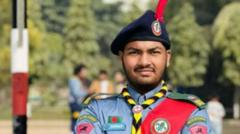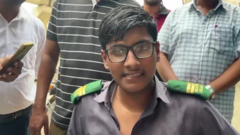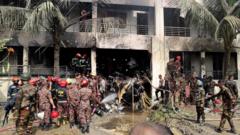The tranquil streets of Dhaka during Ramadan serve as the backdrop for iftar parties, where political factions strategize and form alliances following the removal of authoritarian leadership. Observers closely analyze guest interactions, revealing insights into the shifting political scene in Bangladesh.
Iftar Events Serve as Political Platforms for Bangladesh's Future Leaders

Iftar Events Serve as Political Platforms for Bangladesh's Future Leaders
As Ramadan unfolds, the political landscape in Bangladesh is shaped at iftar gatherings, signaling potential alliances among emerging parties post-authoritarianism.
As the sun sets each evening during the holy month of Ramadan, the bustling city of Dhaka, home to over 10 million residents, experiences a remarkable transformation. The usual hustle, noise, and traffic give way to a quieter atmosphere, particularly as Muslims gather to break their fast. However, for the nation’s political parties, the evening marks a vital opportunity to engage with constituents and launch strategic dialogues.
Iftar parties are not just communal meals; they have become key events for political maneuvering, attracting scrutiny as potential indicators of future alliances in wake of last year's political upheaval that ousted long-standing leader Sheikh Hasina. These gatherings have become culturally significant, providing insight into the evolving geopolitical landscape of Bangladesh.
Last week, as Ramadan was coming to a close, political analysts scrutinized these gatherings for clues about imaginable connections and collaborations among parties in what remains a politically polarized environment. Who aligns with whom, and who is sharing a table, can signal budding coalitions and alliances that may shape the future governance of Bangladesh.
To understand this dynamic better, we attended an iftar hosted by the Gono Odhikar Parishad, a smaller party that emerged from earlier protests against the previous regime. The choice of venue—a rooftop restaurant—was symbolic of the aspirations of this party and its supporters. Amidst the simplicity of breaking bread, deeper discussions on political alliances and the direction of the country unfolded.
As the political climate remains taut, the subtleties observed in these social gatherings reflect broader themes. The collective meal serves not only as nourishment but as a fertile ground for strategizing the nation’s next steps, offering hope for a more democratic future. The engagement during iftar festivities represents a gradual shift towards rebuilding the political ties that can lead Bangladesh beyond its authoritarian past.


















